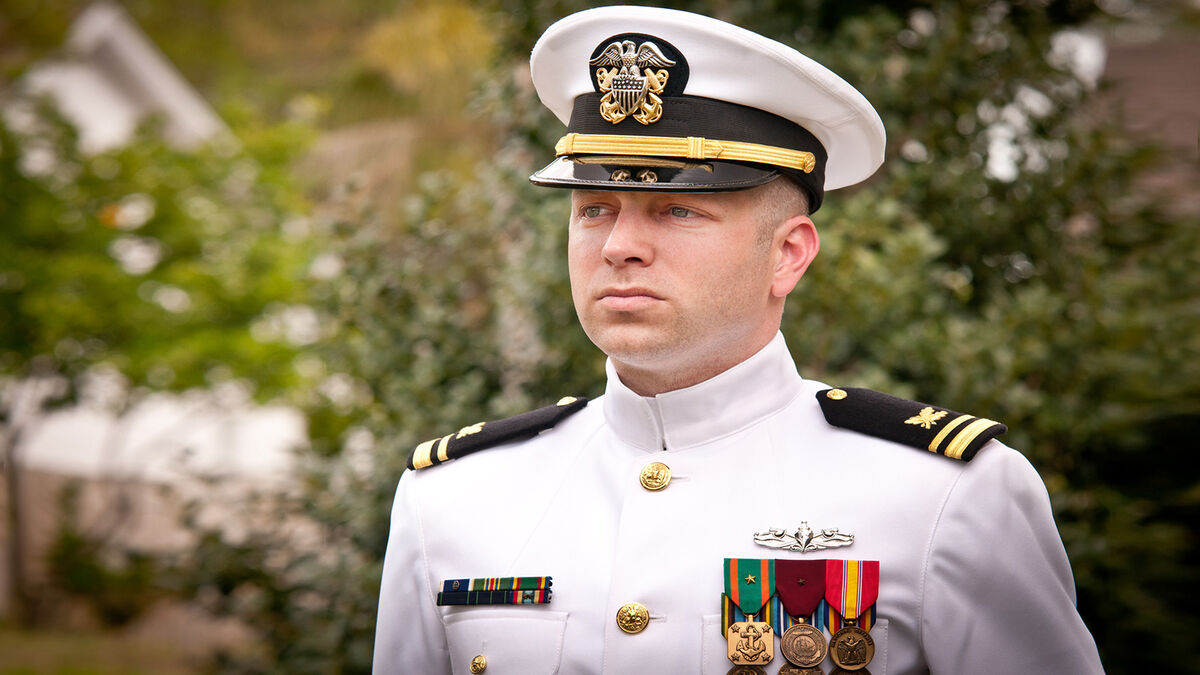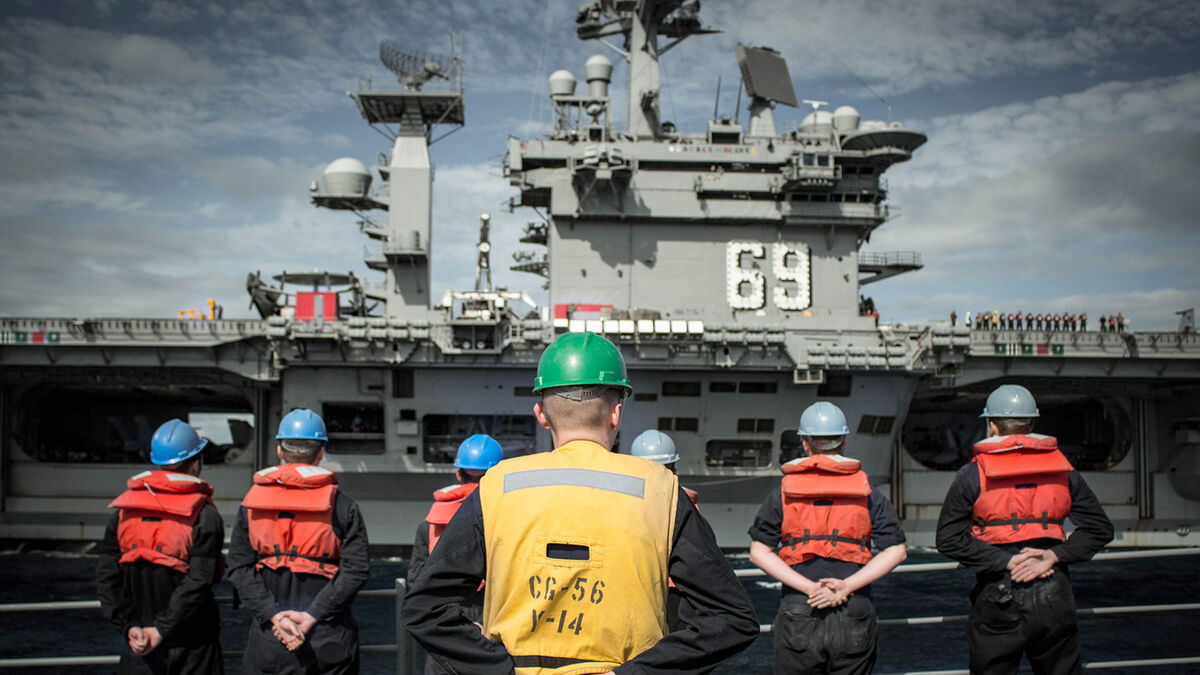
If you’ve been in the armed services, know an enlisted soldier, or watched movies about the military, you know that military slang is practically a second language. Military slang helps soldiers convey a lot of information very quickly and allow troops to bond in life-threatening situations. Learn more with a list of these sayings and what they mean in the context of the military.
Military Slang Examples
The armed services have long been a hotbed of extremely creative (and sometimes rather vulgar) language coining, all of which translates into military slang sayings that definitely stick in the mind. There are tons of military euphemisms that are so original that they've gained usage in the civilian world. Because many of these sayings contain profanity, they have been censored when necessary.
Military Slang for People
Even without considering a service member’s rank, there are many terms that describe people who have different duties. These terms can range from teasing nicknames for new recruits or members of another of the armed forces. Military slang for people can include:
- Bolo – Someone who can’t pass marksmanship training
- Boot – Recruit still in boot camp
- Devil dog – Term for a member of the U.S. Marine Corps
- Dittybopper – A signals intelligence radio operator who uses Morse code
- Expectant – A soldier who is expected to die from their injuries
- FNG – F’ing New Guy
- FOBbit – A soldier who stays in the forward operating base and hasn’t seen military action yet
- Grape – A term with different meanings in each branch of the military:
U.S. Navy: Soldier who refuels aircraft
U.S. Air Force: An individual who makes a task look easy
U.S. Marines and U.S. Army: Your head - Grunt – Infantryman in the U.S. Army or U.S. Marine Corps
- High speed – Either a term for a very motivated recruit or a sarcastic term for an unmotivated recruit
- Jarhead – Member of the U.S. Marine Corps (named for their distinctive buzz haircut)
- Jeep – Soldier just out of basic training
- Joe – Soldier (from G.I. Joe)
- Latrine queen – Soldier in charge of cleaning the bathrooms
- Leatherneck – Term for a U.S. Marine
- Oxygen thief – Recruit who talks too much
- Pogue – Soldier who does not serve on the front lines
- POG – Person other than grunt (or person on ground)
- Polliwog – U.S. Navy sailor who has not crossed the equator yet
- Puddle pirate – Enlisted member of the Coast Guard
- Rainbow – New recruit who hasn’t passed basic training yet
- Remington raider – Term for U.S. Marines doing deskwork instead of combat duty
- Rotorhead – Helicopter pilot
- Shellback – U.S. Navy sailor who has crossed the equator
- Snake eater – Special Forces soldier
- Squid – Term used to describe members of the U.S. Navy by other service members
- Twidget – Soldier who repairs electronic equipment
- Zoomie – Pilots or other servicemen who fly aircraft
Military Slang for Gear and Supplies
New service members have a lot to learn after they finish bootcamp. Learning slang for gear, supplies, and parts of a uniform can be very helpful. Here are some examples of military slang that describes what soldiers carry and wear:
- Bang-bang – A military-issued rifle or pistol
- Black (on supplies) – Certain supplies have run out
- C rats – Combat rations
- Cammies – Camouflage uniform
- Chest candy – Decorations or awards on an officer’s dress uniform
- Firewatch ribbon – National Defense Service Medal, an award given to all service members during bootcamp
- Fruit salad (or salad bar) – A colorful assortment of military ribbons and medals on an officer’s dress uniform
- Good cookie – Good Conduct Medal (given every three years without a disciplinary offense)
- Jammin’ Jenny – M16 rifle
- John Wayne – Can opener issued with rations
- Leather personnel carriers – Boots
- Mae West – U.S. Navy life jacket (or a term for a twisted life jacket)
- Meat wagon – Ambulance
- Mid rats – Midnight rations for members of the watch crew
- Moonbeam – Flashlight
- People tank – Submarine (U.S. Navy)
- Rack – Bed or sleep
- Rain locker – Shower
- Scrambled eggs – Gold decorations across the bill of a U.S. Navy officer’s hat
- Sky blossom – Parachute
- Slick sleeve – A sailor with no ribbons or medals yet; a cadette that hasn't been deployed overseas yet; or an Airman Basic (E-1) since they have no stripes on their sleeves
- Uncle Sam's canoe club – How the U.S. Navy sometimes refers to the Coast Guard

Military Slang From the NATO Alphabet
Branches of the military use the NATO phonetic alphabet to communicate in coded or high-stakes situations. Many slang sayings have come from these codes and are colorfully used by service members in different situations. Some examples of slang from the NATO alphabet include:
- Alpha Charlie – A vulgar term for being verbally reprimanded (ass chewing)
- Blue Falcon – Someone who betrays you (buddy f’er)
- Bravo Zulu – A compliment meaning “well done”
- Charlie Foxtrot – A vulgar term for a messed up situation (a “clusterf--”)
- Charlie Mike – Continue mission
- Mike – A minute
- NEGAT Bravo Zulu – Not well done
- Oscar Mike – On the move
- Tango Mike – Thanks much
- Tango Uniform – A failed operation (one that went “t--s Up)
Military Slang for Orders and Operations
Understanding your commanding officer’s orders can be a matter of life and death. That’s why many terms regarding orders and operations are in shorthand and have become slang among service members. Some of this slang includes:
- Bag your bandit – Shoot an enemy down
- Barney style – A method of explaining an order in very simplistic terms
- Dustoff – Medical rescue via helicopter
- Field op – Field operation (training exercise)
- Hangfire – Wait for orders
- Hit the silk – Parachuting from an aircraft
- Kinetic – Violent
- Klick (or click) – Kilometer
- Moving like pond water – Moving slowly
- Police call – Order to clean an area
- Rack ops – Time allotted to sleep in the field
- Ruck up – Grab your rucksack and get going (or “man up” for a difficult situation)
- Smoke – To punish a soldier excessively for a minor infraction
- Soup sandwich – A situation that was poorly planned or has gone terribly wrong
- The balloon has gone up – Trouble is coming
- Unsat – Unsatisfactory
- Voluntold – A supposedly “voluntary” task that is actually required

Military Slang for Everyday Life
Military slang is like a second language for soldiers. Slang can cover everyday actions, places, and experiences. Some examples of military slang for everyday life include:
- Big voice – Voice over a loudspeaker
- Crumb catcher – Someone’s mouth
- Dear John letter – Communication from a soldier’s significant other who wants to end the relationship during enlistment
- Errr – Greeting in the U.S. Marines (short for “Oorah”)
- Fang – To rebuke or disparage a fellow soldier
- Five-sided puzzle palace – The Pentagon
- FOB – Forward operating base
- Football bat – Criticism of an order or action that doesn’t seem to make sense
- Fugazi – Messed-up situation
- Gaggle march (pronounced “harch”) – Marching out of step with your fellow soldiers
- Gedunk – Junk food from a vending machine or convenience store (also a term for a new recruit)
- GI party – Cleaning barracks before inspection
- Gone Elvis – Missing in action (MIA)
- Hawk – Cold weather
- High and tight – Term that refers to the U.S. Marine buzz haircut
- Hit the head – Go to the bathroom
- Hooah – Affirmative and/or enthusiastic response in the U.S. Army
- Ink stick – Pen (in the U.S. Marine Corps)
- Mess hall – Hall where service members eat their meals
- Oorah – Affirmative and/or enthusiastic response in the U.S. Marines
- Poguey bait (or poggi bait) – Snacks used to bribe “pogues” to participate in missions
- Scuttle butt – A circulating rumor (typically in the U.S. Navy)
- Tactfully acquire – Taking needed equipment without permission
Military Slang Acronyms
Much of military slang is found in acronyms. You’ll also find the majority of profane slang here, as it’s much easier to hide these words in an acronym! Check out these examples of military slang acronyms:
- ASAP – Immediately (as soon as possible in non-military contexts)
- BOHICA – Bend over, here it comes again
- DEROS – Date estimated return overseas
- FIGMO – Finally, I got my orders (or F* it, got my orders)
- FTA – Failure to adapt (or F* the Army)
- FUBAR – F’ed up beyond all repair (or recognition)
- GI – Government issue, a term for soldiers who feel interchangeable
- ROAD Warrior – Retired on active duty
- SNAFU – Situation normal: all f’ed up
- SUSFU – Situation unchanged: still f’ed up
- TARFU – Totally and royally f’ed up
- Whiskey Tango Foxtrot – What the F?
Military Expressions
Serving in the military requires discipline, bravery, and the utmost communication. That’s why military slang, expressions, and abbreviations are especially important to understand. An article that lists military acronyms can help you sort through some of the commonly confused abbreviations in the armed services.